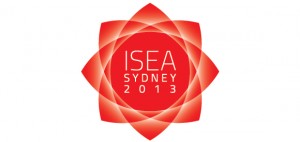 Teresa Dillon invited me to be part of a panel she curated for ISEA2013 in Sydney Rogue Troopers: Designing functional and fictional disruptions. The panel was part of the conference program stream: Resistance is Fertile. (The title of the panel referred to the Rogue Trooper character in the 2000 AD comic, alluding to his underground resistance status!!)
Teresa Dillon invited me to be part of a panel she curated for ISEA2013 in Sydney Rogue Troopers: Designing functional and fictional disruptions. The panel was part of the conference program stream: Resistance is Fertile. (The title of the panel referred to the Rogue Trooper character in the 2000 AD comic, alluding to his underground resistance status!!)
The panel linked to a workshop she also ran during the conference on synthetic biology methods for general lay person when working with students, designers, citizens: Synthetic Scenarios and Stories.
It was a great discussion, and Teresa is also currently considering the possibility developing a publication further exploring the topic.
Chair
Teresa Dillon: Polar Produce / Science Gallery, Trinity College, Dublin, UK
Panelists
Paul Granjon: Z Productions, Wales, UK
Peter Hall: Griffith University Queensland College of Art, Brisbane, Australia
Amanda McDonald Crowley: Public Art Action, New York, US
ABSTRACTS
Rogue Troopers: Designing functional and fictional disruptions addresses the question: What role can artists, curators, writers and designers play in crafting subversive uses for existing technologies and imagining alternatives?
In bringing together practitioners who are working across the field of critical and contemporary media art, resistance will be discussed in relation to practices of hacking, civic change, mapping, activism and technological appropriation.
Presentation 1: Teresa Dillon Rogue Troopers: Designing functional and fictional disruptions
According to Oliver Sacks (2012), in order to survive human beings need to transcend the everyday, we need to see the overall patterns of our lives and we need freedom, or at least, the illusion of freedom. But what enables this sense of freedom? It could be argued that resistance as a mode of action and expression enables us to rise above our immediate surroundings by providing a sense of autonomy and control. Resistance in this way operates as a release mechanism or a form of action, which enables individuals to address the tensions that reside within and between communities of power and governance.
Reflecting on my role as curator for HACK-THE-CITY, a three-month exhibition which took place at the Science Gallery, Dublin in 2012, I will provide examples of how the exhibition and its associated program could be read as a site for resistance. Drawing on specific events within the program and selected artists’ works, I will discuss how independent curators, artists and institutions can play a role in catalysing civic change. This analysis will be contextualised within contemporary discourses on hacking and critical media art practice.
Presentation 2: Peter Hall Mapping the intangible
Writing in the 1990s, the critic Fredric Jameson argued that the postmodern condition, with its vast global networks in which we are “caught as individual subjects,” calls for “an aesthetic of cognitive mapping”. Over the subsequent two decades, Jameson’s hypothesis was effectively tested in the wave of cultural activity around mapping, partly enabled by the accessibility of two formerly military technologies: satellite navigation and the internet. Mapping and information visualisation were relinquished from the tight grip of professionals into the spheres of amateur, open source and experimental practice.
More recently, the geographer Jeremy Crampton has analysed contemporary mapping practices, arguing that it is a “field of knowledge and power relations” being pulled in several different directions. Crampton describes a pull toward ‘securitization’ on one side, countered by ‘resistances’ on the other. ‘Securitization’ emerges from post-war efforts to rid cartography and GIS of any association with art and propaganda and render it ‘post-political’— a position that the resistance side generally finds untenable. The resistance side is characterised by critical cartography, map art and the open source movement; millions of amateurs and novices using hitherto inaccessible mapping technologies to construct a vast ‘geoweb’.
In co-opting former military technologies, the recent wave of locative media practitioners exemplifies an emergence of disruptive, resistant practices. With smart phones, space is annotated and re-stitched together and new networks are galvanised. Drawing from a range of writers and theorists, this presentation explores the functional and fictional possibilities of this activity.
Presentation 3: Paul Granjon Collaborative Manufacturing Units Against the Black Box
The pervasiveness of contemporary technology goes hand in hand with opacity. Users generally have little or no knowledge of how the objects and networks they depend on work, becoming black box operators. As a visual artist working with technology, I am investigating ways of reducing this ignorance. I run durational collaborative manufacturing units where technological items are broken and recycled in creative ways. The participants engage in learning, making and sharing an experimental process that disrupts the disempowered consumerist attitude towards technological items. The talk explores some of my projects, as well as recent initiatives by other artists and activists.
Presentation 4: Amanda McDonald Crowley Open Cultures: cultivating collaboration
“We are a cultural laboratory re-imagining possible futures at the interstices of art, science, nature, and everyday life.” [foam]
Artists are increasingly working in collaborative ways to develop work that moves beyond conventional gallery spaces and into the world, and our lived experience. Through the lens of recent curatorial research into ArtTechFood, Urban Research, and Open Culture, I will look at the history of artist labs as spaces to work creatively and build community. I am especially interested in how artists are currently making significant contributions to open source movements, mapping, sharing, collaboration, DIY, knowledge sharing, and skills transfer to explore open knowledge and build open utopias. What are the possibilities and pitfalls of curating this kind of research and process?


You must be logged in to post a comment.